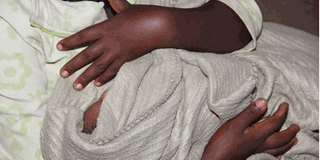Defilement cases rise sharply as children stay at home

A 12-year-old girl who was defiled and impregnated in Uasin Gishu County in 2014 cuddles her baby. Defilement cases are on a new high during the Covid-19 lockdown. Photo | Nation Media Group
What you need to know:
- In Nyalenda, one of the biggest slums in Kisumu, cases of defilement have become rampant.
- In March, children aged three and five, were lured by a neighbour and defiled at a place called Kilo.
- Poverty and insecurity are linked to the cases of defilement in Kisumu.
Lucy Atieno (not her real name) waits at Ahero social justice centre just opposite the police station.
She has a few belongings in her backpack. She is about to go to a safe place. But from the look on her face, the 16-year-old is full of sorrow. The orphan seems lost and detached from her environment.
About three weeks ago while going to visit her schoolmate for their usual studies at 6pm, things took a wrong turn.
The teenager was attacked and defiled by a person known to her. Life has not been the same.
DEFILEMENT
“I was just passing by one of the unfinished houses, suddenly a guy called me. At first I thought it was one of the neighbours who usually does weight lifting,” she narrates.
“He turned out to be a different person all together, he got hold of me by force and defiled me,” she recounts.
Atieno only recalls running to her schoolmate’s home, who later informed her brother of what happened. They took her to hospital.
A community health advocate who is helping the family says the culprit is a political goon linked to an influential leader. He was arrested and police are handling the case.
In Nyalenda, one of the biggest slums in Kisumu, cases of defilement have become rampant.
In March, children aged three and five, were lured by a neighbour and defiled at a place called Kilo.
The children were taken to hospital and relevant tests done before treatment. Kisumu OCPD Martha Ngetich said the suspect was arrested and the matter is in court.
These are some of the many cases of defilement in the county. The hotspots in the county are Seme, Nyando and Muhoroni.
CASES UNREPORTED
Kenya Female Advisory Organisation director Easter Achieng says cases of defilement have increased and others go unreported.
“Seme is highly profiled because the paralegals are vocal. Other cases go unreported because members of community are compromised or feel the wheel is justice is too slow,” she said.
According to Gender Based Violence Rescue Centre at Jaramogi Oginga Odinga Teaching and Referral Hospital, about 388 cases of defilement have been reported between January and April with the youngest being a 3-year-old girl.
Probably the highest number was recorded in the month of March with 159 cases.
Nurse in charge at the GBV centre Pamela Olilo notes that this is the period when schools were closed and a national curfew introduced as a measure to control the spread of Covid-19.
“The figures are highest in March because of many hours spent with abusive people, thus exposing girls to more episodes of abuse,” said Ms Olilo.
The abusers range from close relatives and people they have known and trusted, who include biological fathers and stepfathers.
But the most worrying trend is the defilement cases among minors themselves. For instance in February and March the cases were 97 and 102 respectively.
“From our statistics the cases of defilement among minors is at 75 per cent while case of adult defiling a minor is at 25 per cent,” she says.
SEXUAL OFFENCES ACT
Sexual Offences Act is categorical that a person below 18 years cannot consent to sex.
It provides a punishment of life imprisonment for anyone who defiles a minor below the age of 12, and 15 years or more if the girl is between 13 and 18 years.
Children’s Department coordinator Humphrey Wandeo noted that the number of children who sought antenatal care was high in January.
"Unfortunately we get to learn about cases six months after the act when a lot has gone behind the scenes," said Mr Wandeo.
Caren Omanga a community health advocate in Nyando says a greater number of mothers going to antenatal are teenagers.
“If you go to most of the public hospitals such as Ahero and Rabour you will find young mothers lined up seeking antenatal services,” says Mrs Omanga.
Poverty and insecurity are linked to the cases of defilement in Kisumu.
“Some of these children come from poor background. Others come from broken families that expose them to perpetrators,” says Mrs Omanga.
While young girls in slums are seeking survival, they end up to be victims of sexual abuse.
“Things like child labour and teenage headed families have exposed and made girls vulnerable to sex pests,” she said.




